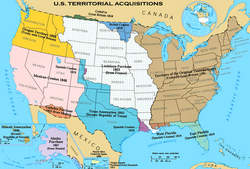Our website is made possible by displaying online advertisements to our visitors.
Please consider supporting us by disabling your ad blocker.
Settler state
It has been suggested that this article be merged into Settler colonialism. (Discuss) Proposed since February 2025. |

A settler state is an autonomous or independent political entity established through settler colonialism by and for settlers. This occurs when a migrant settler society assumes a politically dominant position over the indigenous peoples and forms a self-sustaining state that operates independently of the metropole, the homeland of a colonial empire. Such states are founded upon settler domination over the natives. In many cases, indigenous populations were largely displaced, eliminated, and subject to colonial genocide and ethnic cleansing. Unlike conventional colonies, which primarily exploited natural resources for the benefit of the metropole, settlers saw settled land as their homeland, and sought to strengthen settler institutions. Countries that have been described as settler states include the United States, Canada, Australia, New Zealand, Israel, and Taiwan, and formerly South Africa, Liberia, and Rhodesia.[1][2][3]
- ^ Weitzer, Ronald (2023-11-15). Transforming Settler States: Communal Conflict and Internal Security in Northern Ireland and Zimbabwe. Univ of California Press. pp. 24–30. ISBN 978-0-520-33328-4.
- ^ Liu, Sung-ta (2013-04-01). "Settler urban legacies: A case study of Taipei City". Cities. 31: 239–247. doi:10.1016/j.cities.2012.06.018. ISSN 0264-2751.
- ^ Bratton, Michael (1979). "Settler State, Guerrilla War and Rural Underdevelopment in Rhodesia". Issue: A Journal of Opinion. 9 (1/2): 56–62. doi:10.2307/1166943. ISSN 0047-1607.
Previous Page Next Page


